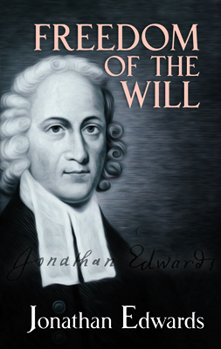Freedom of the Will
(Part of the Works of Jonathan Edwards (#1) Series and The Works of Jonathan Edwards: With a Memoir of His Life and Character Series)
Select Format
Select Condition 
Book Overview
One of America's preeminent philosophical theologians, Jonathan Edwards (1703-58) was a central figure in New England's first Great Awakening. Famed for his stirring sermons, Edwards remains a significant influence on modern religion, and this in-depth analysis of Calvinist beliefs represents his most important contribution to Christian thought.
Romans 9:16 ("It is not of him that willeth") serves as the text for Edwards' examination of the nature and state of man's will. Written in 1754 while the author served as a missionary to Native Americans, this polemic raises timeless questions about desire, choice, good, and evil. Edwards contrasts the opposing Calvinist and Arminian views of free will and addresses issues related to God's foreknowledge, determinism, and moral agency. His copious quotations from scripture, along with citations from the works of Enlightenment thinkers, support a thought-provoking exploration of mankind's fallen state and the search for salvation.
Romans 9:16 ("It is not of him that willeth") serves as the text for Edwards' examination of the nature and state of man's will. Written in 1754 while the author served as a missionary to Native Americans, this polemic raises timeless questions about desire, choice, good, and evil. Edwards contrasts the opposing Calvinist and Arminian views of free will and addresses issues related to God's foreknowledge, determinism, and moral agency. His copious quotations from scripture, along with citations from the works of Enlightenment thinkers, support a thought-provoking exploration of mankind's fallen state and the search for salvation.
Format:Paperback
Language:English
ISBN:0486489205
ISBN13:9780486489209
Release Date:June 2012
Publisher:Dover Publications
Length:272 Pages
Weight:1.00 lbs.
Dimensions:0.6" x 5.3" x 8.4"
Customer Reviews
4 ratings
tough read
Published by Thriftbooks.com User , 15 years ago
I'm not a very smart guy. It took every ounce of my resolve to get through this book. I didn't understand all the arguments. However, I have a far better understanding of the Calvinist position on predestination. I learned a lot about how to construct logical argument. One of his main technique is precisely defining his terms; for example, what exactly is "the will." He then shows how Arminians define the term in self-contradictory ways. I found "Religious Affections" much more convicting and accessible, but Edwards demonstrates his penetrating intellect more in "Freedom of the Will.". I would suggest planning to spend a lot of time trying to understand the arguments in this book. This particular edition has a lot of typos. Something about "Cod's majestic glory" made me chuckle. Another problem is that there is no explanation by the publisher. Footnotes go on for pages and then are signed by "-W" Is this Edwards? Is this somebody else? Great book. I don't know if it would convince a die hard Arminian, but the book makes me meditate on the nature of God and his relationship with creation and his creatures. Is God the author of evil? How can we be held responsible for moral choices when we are morally deficient to make good choices? What is human will? I definitely need to go through the book again.
Most profound study from America's premier philosopher
Published by Thriftbooks.com User , 16 years ago
We are free to do what we desire - but our desires are enslaved to sin ensuring that our "will" is no longer truly free. So argues Jonathan Edwards, considered by many to be America's premier philosopher and theologian. Few have given this difficult topic the kind of attention and logical sophistication that Dr. Edwards did in this treatise. Whether we are students of Calvin, Luther, Augustine, or Aquinas, there is much in this work we can appreciate from this giant of American intellects. This is not for the casual theological/philosophical mind but requires a great deal of concentration to grasp. The somewhat anachronistic 18th century language gives the work even more challenge. But the deeper appreciation of God's providence and grace will be it's own reward. These are not the doctrines of fatalism as another reviewer has described. These are the doctrines of a God who reaches out to mankind in our helpless state. It is by grace and grace alone that we can know and serve God only by the movement of His Holy Spirit in our lives. There may be subtle differences between the great thinkers on this topic (mentioned earlier) but none deny the essential truth that mankind is lost and finds no rest until it rests in Him. Essential reading for philosophers and theologians alike.
Great Work
Published by Thriftbooks.com User , 21 years ago
This is truly one of the greatest works written. Daniel Webster wrote: "The Freedom of the Will" by Mr. Edwards is the greatest achievement of the human intellect." The London Quarterly Review wrote about this work: "His gigantic specimen of theological argument is as near to perfection as we may expect any human composition to approach. He unites the sharpness of the scimetar [sic] and the strength of the battle-axe." A former President of Princeton said that Edwards was "The greatest thinker that America has produced."
Agreement with Sproal
Published by Thriftbooks.com User , 24 years ago
This is indeed a fine work. A rather detailed work as well (without getting to gripped by techinicality). If you haven't read it..beware it is not the easiest read, but it isn't a difficult one either. Prepare to spend a little time with it to grasp its full message. If you don't have this one...you need it. Grace and peace.






